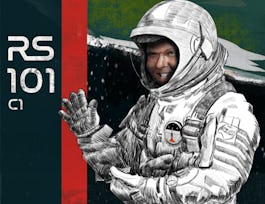The goals of this course are to develop the student’s critical thinking skills, global awareness, and ability to work as an integral part of a team in an increasingly complex global job market. The course provides a foundation in such skills as team building, collaboration, and elevated empathy using real-world scenarios from some of world’s most effective collaborative projects including the Earthrise-2068 Project.


Introduction to the Orbital Perspective
Taught in English
Some content may not be translated
3,353 already enrolled
(20 reviews)
Details to know

Add to your LinkedIn profile
3 quizzes
See how employees at top companies are mastering in-demand skills


Earn a career certificate
Add this credential to your LinkedIn profile, resume, or CV
Share it on social media and in your performance review

There are 10 modules in this course
In this first lesson the student will be introduced to the concept of the Orbital Perspective and given a glimpse to its implications for our global society.
What's included
3 videos4 readings1 discussion prompt
In this lesson the student will be introduced to the history leading up to the International Space Station (ISS) partnership and to some of the technical and cultural challenges that faced the partners in the early days of the International Space Station Program
What's included
3 videos3 readings1 discussion prompt
How did we go from those early days of mistrust and suspicion to building and operating the International Space Station? What was the secret ingredient that enabled a coalition of fifteen nations to work together systematically, in a fully integrated manner, to construct and operate the most complex structure ever built in space? Is there something we can learn from how the members of the ISS program learned to overcome differences and cultural misunderstandings in order to accomplish remarkable things together? Can we use these same techniques to reach agreements on things such as alleviating poverty, mitigating climate change, or achieving peaceful solutions to long-term conflicts?”
What's included
3 videos3 readings1 quiz1 discussion prompt
In this lesson the instructor will share a profound shift in perspective experienced during his first space mission and take a deep dive into the meaning of the orbital perspective. We will also explore examples how taking an orbital perspective can affect our global society.
What's included
7 videos3 readings1 discussion prompt
In this lesson we will explore the frameworks we use to construct our view of the world and the implications of taking on a conviction that we do not have to accept the suffering and conflict on our planet as inescapable. This lesson will also compare and contrast effective and ineffective forms of collaboration.
What's included
3 videos3 readings1 quiz
In the third section of the course "Looking Forward", we will explore some of the many efforts to connect billions of minds and tap into our collective global genius. We will further examine the barriers to global collaboration and explore ways to break down those barriers. And we will hear some stories about amazing people who are building bridges to collaboration and making great strides toward overcoming our world’s biggest challenges. This lesson will also explore what factors led to success in a very high stakes situation. Participants will be exposed to some of the “perverse incentives” that limit the effectiveness of global humanitarian development and crisis response efforts. This lesson should lead to a discussion on how to better provide assistance worldwide.
What's included
2 videos4 readings1 discussion prompt
The exponential increase in collaborative technology is rapidly rewriting the way people and organizations interact. In this lesson we’ll look at several movements and initiatives that are synthesizing the orbital perspective and the worm’s eye view, making vast amounts of information accessible and bringing large groups of people together to work toward common causes. In some cases, collaboration is not facilitated by long-term personal relationships. Instead, the bond is the common cause, the shared experience, and in some cases simply being given the permission and means to help.
What's included
3 videos3 readings1 discussion prompt
In these last three concluding lessons we will connect all the previous lessons into a specific “Call to Action”. Included in the call to action is a desire to spark a global conversation about the need to have a deeper level of collaboration toward solving the world’s toughest and most seemingly intractable problem. In the lesson participants will be exposed to some of the efforts that are rewriting the way humans interact on and off our planet.
What's included
3 videos3 readings1 discussion prompt
This lesson will focus on methods to create an actual or virtual “Control Room of Spaceship Earth”.
What's included
1 video2 readings1 quiz
This concluding lesson will focus on ways to continue the momentum that was created by the course and continue to propel the Earthrise-2068 project forward.
What's included
1 video2 readings1 peer review
Instructor

Recommended if you're interested in Governance and Society

Arizona State University

University System of Georgia

University of Michigan

Technical University of Munich (TUM)
Why people choose Coursera for their career




Learner reviews
Showing 3 of 20
20 reviews
- 5 stars
65%
- 4 stars
25%
- 3 stars
0%
- 2 stars
5%
- 1 star
5%

Open new doors with Coursera Plus
Unlimited access to 7,000+ world-class courses, hands-on projects, and job-ready certificate programs - all included in your subscription
Advance your career with an online degree
Earn a degree from world-class universities - 100% online
Join over 3,400 global companies that choose Coursera for Business
Upskill your employees to excel in the digital economy
Frequently asked questions
Access to lectures and assignments depends on your type of enrollment. If you take a course in audit mode, you will be able to see most course materials for free. To access graded assignments and to earn a Certificate, you will need to purchase the Certificate experience, during or after your audit. If you don't see the audit option:
The course may not offer an audit option. You can try a Free Trial instead, or apply for Financial Aid.
The course may offer 'Full Course, No Certificate' instead. This option lets you see all course materials, submit required assessments, and get a final grade. This also means that you will not be able to purchase a Certificate experience.
When you purchase a Certificate you get access to all course materials, including graded assignments. Upon completing the course, your electronic Certificate will be added to your Accomplishments page - from there, you can print your Certificate or add it to your LinkedIn profile. If you only want to read and view the course content, you can audit the course for free.
You will be eligible for a full refund until two weeks after your payment date, or (for courses that have just launched) until two weeks after the first session of the course begins, whichever is later. You cannot receive a refund once you’ve earned a Course Certificate, even if you complete the course within the two-week refund period. See our full refund policy.






